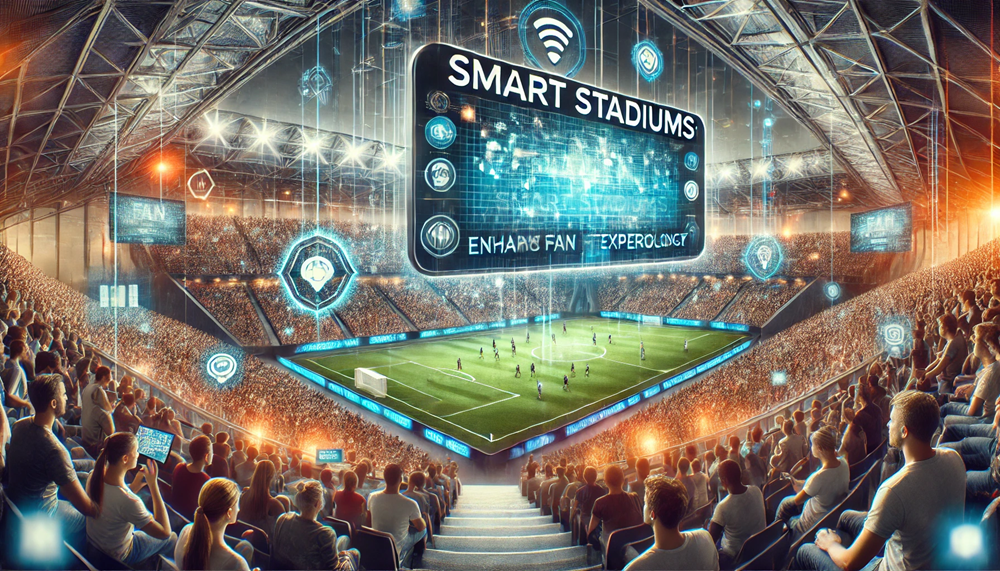Smart Stadiums: Enhancing Fan Experience with Cutting-Edge Technology
In 2025, the concept of attending a live sporting event has transformed thanks to the rise of smart stadiums. These advanced arenas leverage cutting-edge technology to create an unparalleled fan experience, blending convenience, entertainment, and engagement like never before. From seamless ticketing systems to immersive augmented reality (AR) features, smart stadiums are setting new benchmarks for live events. Here’s how these innovative venues are revolutionizing the fan experience.
What Are Smart Stadiums?
Smart stadiums are modern sports venues equipped with advanced technologies such as Internet of Things (IoT) devices, high-speed connectivity, and AI-powered systems. These features enable stadiums to deliver personalized and interactive experiences to fans while optimizing operations for efficiency and sustainability.
Key Features of a Smart Stadium
- IoT sensors for real-time data collection and crowd management.
- High-speed 5G networks for uninterrupted connectivity.
- Integrated mobile apps for ticketing, navigation, and in-seat services.
- Sustainability initiatives like energy-efficient systems and waste management.
Enhancing the Fan Experience
The primary goal of smart stadiums is to improve the experience for attendees, making it more convenient, interactive, and enjoyable.
Seamless Entry and Navigation
- Mobile Ticketing: Fans can enter the stadium using digital tickets stored on their smartphones, eliminating the need for paper tickets and reducing wait times.
- Wayfinding Technology: AR-enabled mobile apps guide fans to their seats, restrooms, and concession stands, ensuring smooth navigation in large venues.
In-Seat Services
- Fans can use stadium apps to order food and beverages directly to their seats, avoiding long lines at concession stands.
- AI-powered systems recommend menu items based on past orders, creating a personalized experience.
Immersive Game Viewing
- Augmented Reality Features: Fans can point their phones at the field to access real-time stats, player profiles, and live commentary.
- 360-Degree Cameras: Provide panoramic views of the action, allowing fans to replay key moments from different angles.
- Giant Interactive Screens: Display dynamic content, including instant replays, fan polls, and social media feeds.
Connectivity and Engagement
High-speed internet and interactive features keep fans engaged and connected throughout the event.
5G Networks
- Enable seamless video streaming, social media sharing, and app functionality.
- Ensure low latency for real-time AR and VR experiences during the game.
Fan Interaction
- Social Media Integration: Fans can participate in live polls, contests, and hashtag challenges displayed on stadium screens.
- Gamification: Mobile apps offer rewards for engaging in stadium activities, like cheering for the team or completing trivia challenges.
Optimizing Operations with Smart Technology
Smart stadiums are not just about enhancing the fan experience; they also improve operational efficiency and sustainability.
Crowd Management
IoT sensors monitor crowd density, enabling real-time adjustments to reduce congestion in high-traffic areas like entrances and restrooms.
Energy Efficiency
- Smart Lighting: Automated LED lighting systems adjust brightness based on crowd activity and natural light.
- Solar Panels: Many smart stadiums integrate renewable energy sources to power operations sustainably.
Waste Management
AI-powered systems analyze and sort waste, promoting recycling and reducing landfill contributions.
Safety and Security
Advanced technology ensures that fans can enjoy games in a secure environment.
Facial Recognition
Biometric systems verify ticket holders’ identities, enhancing security and speeding up entry.
Real-Time Surveillance
AI-powered cameras detect unusual activities and alert security personnel instantly.
Emergency Alerts
Smart stadiums use connected systems to notify fans of emergencies and provide clear evacuation instructions through apps and digital signage.
Examples of Smart Stadiums
Several venues worldwide are leading the charge in implementing smart technologies.
SoFi Stadium (Los Angeles, USA)
- Features high-speed Wi-Fi, AR-enhanced fan experiences, and energy-efficient systems.
Tottenham Hotspur Stadium (London, UK)
- Boasts a retractable field, advanced lighting, and a state-of-the-art app for fan engagement.
Allianz Arena (Munich, Germany)
- Utilizes IoT for crowd management and LED systems for dynamic lighting displays.
The Future of Smart Stadiums
The future of smart stadiums lies in deeper integration of emerging technologies like AI, blockchain, and VR. Blockchain-based ticketing systems could eliminate counterfeiting, while VR could offer fans at home an immersive stadium experience. Additionally, as sustainability takes center stage, smart stadiums will adopt more eco-friendly solutions, setting benchmarks for green architecture.
Smart stadiums are revolutionizing the live sports experience, blending technology and innovation to cater to the modern fan’s expectations. From immersive AR features to streamlined operations, these venues are redefining what it means to attend a live event. As more stadiums embrace these advancements, the future of sports entertainment promises to be smarter, more engaging, and more sustainable.










